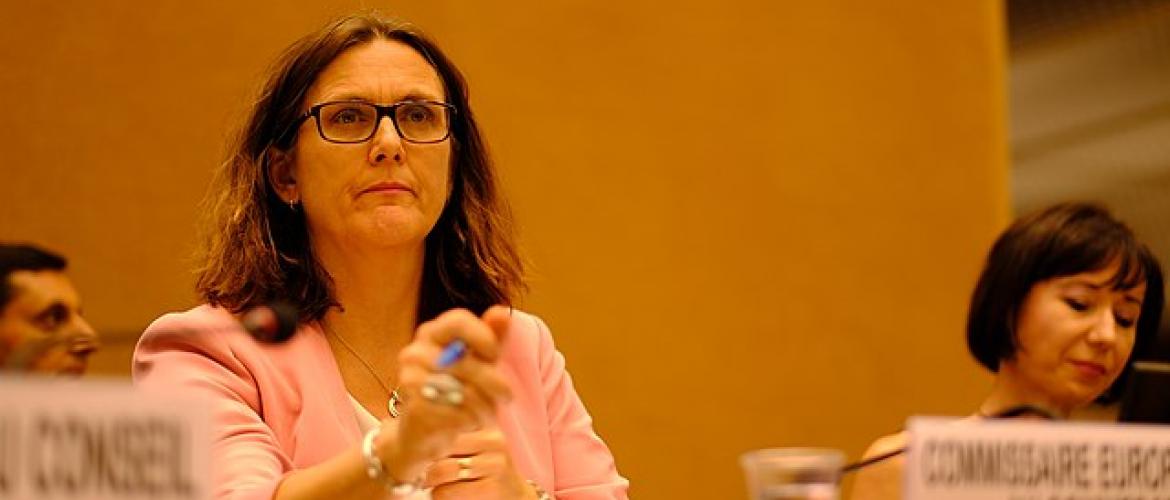EU Trade chief criticizes China
April 9, 2019 | Expert Insights

Cecilia Malmstrom has voiced frustration over China’s trade policies ahead of a summit this week as Brussels struggles to get Beijing to deliver on commitments to open up its market to European investments.
Background
The European Commissioner for Trade (sometimes referred to as the EU Trade Commissioner) is the member of the European Commission responsible for the European Union’s common commercial policy (governing international trade). The portfolio has been held by Cecilia Malmström (Sweden – FP / ALDE) since November 2014.
Cecilia Malmström is a Swedish politician who has served as European Commissioner for Trade since 2014. She previously served as European Commissioner for Home Affairs from 2010 to 2014 and Minister for European Union Affairs from 2006 to 2010. She was a Member of the European Parliament (MEP) from Sweden from 1999 to 2006. She is a member of the Swedish Liberals party, part of the Alliance of Liberals and Democrats for Europe.
Analysis
EU trade commissioner Cecilia Malmstrom said the bloc would not follow the US route of using punitive tariffs to try to force China to the negotiating table. European steelmakers are among those to have been hit by additional duties imposed by US president Donald Trump since he took office, and Brussels has attacked the measures as a breach of World Trade Organization rules.
However, Ms Malmstrom stressed that Europe shared US exasperation about China’s model of “massively” subsidised state-owned enterprises that expand abroad through acquisitions.
The Commissioner defines the trade interests of the EU and negotiates bilateral, regional or multilateral agreements with third countries. She monitors the implementation of such agreements and deals with any unfair practices, devises and monitors internal and external policies concerning international trade, ensures consistency in EU external policies and provides up-to-date public and industrial economic information.
A five-year-long effort to negotiate an EU-China investment treaty is “not moving as fast as it should”, Ms Malmstrom said. “It’s been going for a long time now and we’d hoped that China would be a little more open to do this. We have exchanged offers, that is a step forward, but they are very modest.”
Brussels sees the treaty as the most direct way to address complaints from European businesses who say they are denied the investment and takeover opportunities enjoyed by Chinese companies in Europe.
Pushed by Germany and France, the EU last month hardened its stance towards Beijing, calling China a “systemic rival”. Brussels is planning to introduce legal tools to fight takeovers by state-backed groups and to tighten access to the EU’s public procurement market. French leader Emmanuel Macron called it the end of “European naïvéte.”
The EU’s frustrations have been heightened by Beijing’s resistance to including commitments to open markets in the communiqué that is supposed to be adopted at Tuesday’s EU-China summit in Brussels.
A senior EU diplomat warned that negotiations between European and Chinese officials had made little headway because Beijing was stalling “on a range of important issues” including reciprocal market access and WTO reform.
“This doesn’t bode well and constitutes already now a serious burden for the summit,” the diplomat said. “If China doesn’t change its negotiation positions substantially and engage in a meaningful way, there will not be enough common ground to agree on joint declaration.”
Ms Malmstrom said she hoped that trade talks underway between the US and China would lead to “systemic concessions” from Beijing that would also benefit China’s other trading partners such as the EU.
US ambitions in the negotiations include ending forced technology transfer from its businesses active in China — also an EU priority.
While Brussels has welcomed the trade talks between the US and China, it is wary of some of the details of the deal under negotiation. Washington’s attempts to get Beijing to commit to buying more American products and take other steps to reduce its trade surplus are examples of “managed trade” policies that the EU argues violate the spirit of the WTO system.
Assessment
Our assessment is that Ms. Malmstrom’s criticism of China is valid considering the EU has opened up its markets for heavy Chinese investments whereas there has been no reciprocal action from Beijing regarding European investments in China. We believe that with Italy officially joining the Belt and Road Initiative (BRI), the EU has to be assertive of what it needs from China in exchange for Beijing’s almost limitless access to European markets.








Comments